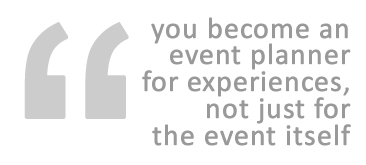In the business world in North America the name Brian Solis is everywhere. A serial entrepreneur and business visionary he is a very well respected source of opinion when it comes to social media and marketing.
The events management magazine BizBash interviewed him last month (full interview here) on his views about strategies for events and we thought we'd share and summarise his top pearls of wisdom for you.
Big Data
- Through the use of different technology or the event's data that is being generated at an event, data can be tracked to help understand how people are moving through an event or how people are talking about an event. It is like a live feedback form
- Facebook are using RFID technology on their badges to understand how people move around the floor. For the next event they can plan and optimise the design of the space itself
Technology
- Technology in our society is evolving faster than our ability to adapt. Consumers become more connected, more empowered, more informed and their expectations escalate. Companies that adapt to these changes will have an upper hand
Shared Experiences and Social Media
- As people use more social media to stay connected, they feel a psychological need to constantly update their status and keep their own communities engaged. From an event point of view people are sharing every moment of that experience good or bad, and this is very powerful. As B2B event marketers we
 need to influence those conversations
need to influence those conversations - Event marketers and planners need to think of an event not as something that takes place within the four walls of your conference center but as an event that is taking place in the cyberspace as well
- What is it that you want people to share out to their social networks? So put experiences around the room that people would like to pin, instagram or tweet.
- Make use of the FOMO - Fear Of Missing Out so your and their peers see that they should have been there, so they go next year
- Speakers get frustrated with an audience that is not looking at them but their phones, computers or tablets. But they are missing the point - the audience is not just the 100 or 500 in the room but the thousands that are connected at that precise moment through their networks
- Event marketers and planners need to help and facilitate for speakers to see the big picture and present in a different way, change the information they share so the information transcends those four walls
- With all this in mind the idea of "the future of business comes down to shared experiences." Shouldn't come as a surprise
- Start to design the event and the experience based on what you want people to share, to think, to do. You must become an event planner (and marketer) of experiences, not just for the event itself
What can event organisers learn and do
- People are always telling you what they like and what they don't like, what they appreciate and what they don't. As an event organiser it's your reponsibility to act on that and aspire to do better.
- Event organisers are talking AT audiences by broadcasting press releases, nice brochures and pretty websites telling them why they should come to the event. They are ignoring the audience of the audience. When you understand that, you change the way you talk.
Content Marketing
- You need to provide the information your audience needs, information that will make for genuine conversations and make everyone having those conversations sound and look smarter
How he goes about his "Pivot" event
- Brian has an event every year called Pivot (about the future of technology) and they design everything for sharing. The playlist of the event is on Spotify, the food and drink are really cleverly designed so people Instagram it or share it on Facebook, presentations are 15 to 20 minutes so they are tweet-able and facebook-able, there is power sockets and internet everywhere.
- After the conference once a month they get together on twitter, have a webinar with the connected speakers and are always pulling new people
- They gather information to help design their event through conversations related to events they admire. They look at how people talked about their conference last year, create an advisory board of people who are incredibly connected and who they see as ideal attendees
- Organising an event is a mentally and physically exhausting excercise, but to keep people engaged, entertained and interested is an "always on" job now. Always on, always evolving
Some great insights about the event world there - especially rethinking formats, focusing more on experiences and the shareability of events.
Do you feel there is anything new in Brian Solis' views?
From a B2B event marketing point of view, it's fair to say that the classic conference companies are very often anti-sharing as they tend to be very cloak and dagger about their events and who's attending, due to the competitors and spies who may be lurking in the dark. But I think it's about time that mindset changed - let's face it the industry has to change and move along with the sharing times, otherwise we'll just get left behind.
How are you ensuring your events are designed for "sharing"?

